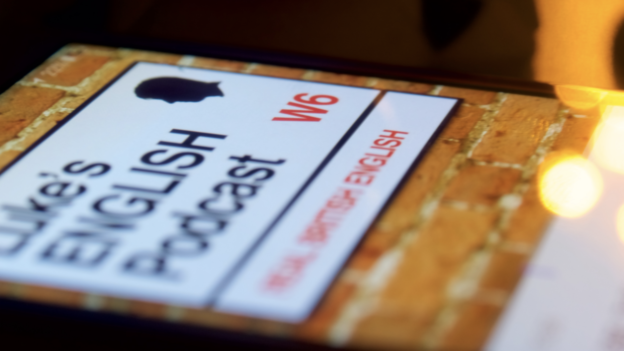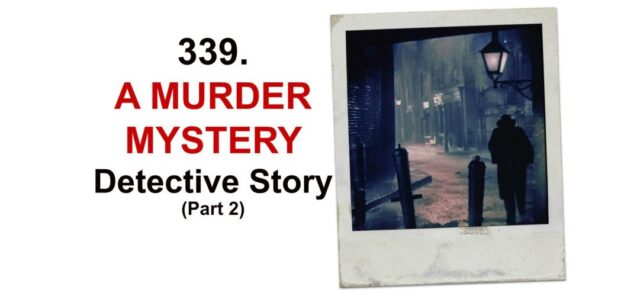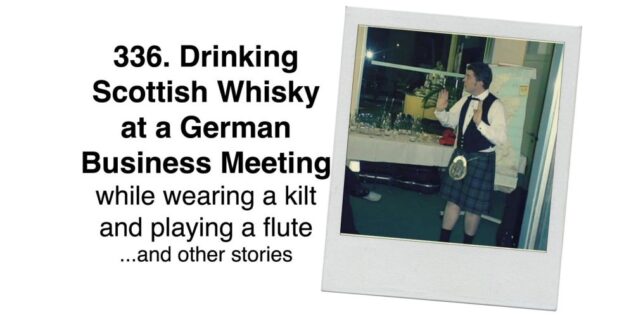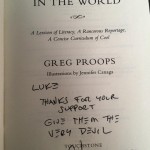This is a special episode about Muhammad Ali and the story of one of his most famous fights, “The Rumble in the Jungle”. In the episode you’ll hear me give a biography of Ali and then I go into lots of descriptive detail about the fight, exploring exactly what happened in and out of the ring and why he is now considered not only one of the greatest boxers but one of the most outstanding people of recent times. The episode is almost 100% transcribed. See below for details.
![]() [DOWNLOAD]
[DOWNLOAD]
It is a cool Wednesday morning here in Paris as I record this episode. Again I’m talking about sport on the podcast today. This time it’s the sport of boxing as I talk about arguably the greatest boxer we’ve ever had, and in fact one of the greatest people of the last 50 years or so – Muhammad Ali. I’ve got a lot to say about the man, so I suspect this could be another long episode of the podcast! I’ve said it before and I’ll say it again – a lot of my episodes are long these days. Now, most of you seem to be fine with that, which is cool. I’ll say that with these episodes you are getting a tremendous amount of English exposure and that is one of the key ingredients in gaining proper English with a wide range of vocabulary and accurate listening skills, which really helps your English in other areas such as your own speaking. You can learn a lot from episodes like this, even if I’m not explicitly teaching language to you. I recommend that you listen closely, get into the story, pay attention and be curious about what’s going to happen next, while noticing the language I’m using to describe the events of Ali’s life and the specific details of his fights. Pay attention to every word, while getting drawn into the story of one of the most extraordinary people of recent years. Look out for not only language for describing the narrative of Ali’s life story but also the specific descriptions of boxing, which will include some complex language to describe body position, movement and technique. I’ve planned this episode quite carefully and took some time to do it. You’ll see almost every word of this transcribed on my website. I strongly recommend that you go and check it out. You could read along with me, or use the script to help you learn English in lots of ways. Alright, that’s my pep talk about learning English with this episode, let’s now get stuck into this subject.
We lost another great person this year, Muhammad Ali. Since Ali died I’ve had quite a lot of messages from listeners saying to me, “Luke, talk about Muhammad Ali!” OK! I would absolutely love to talk about this subject! I am a big fan of Ali, especially his boxing. It’s one of my favourite topics. I’ve never talked about this on the podcast before, but I do have an interest in boxing and martial arts in general and particularly in several fights involving Ali so I am more than happy to talk about this in a special podcast episode to celebrate the life of The People’s Champion, the one and only Muhammed Ali, who truly was The Greatest.
And yes I do consider boxing as a martial art. I think it is a discipline and even though there are rules to boxing that you don’t have in other martial arts, I think true fighters understand that boxing can still be considered a martial art.
On the subject of fighting – I’m one of those people who doesn’t believe in war, doesn’t believe in violence and generally doesn’t like fighting, but I am interested in boxing. I think it is a discipline and it’s a remarkably complex sport which, at the highest level, involves incredible levels of technique, strategy and skill. It’s also a huge mental challenge as well as a physical one.
I would try doing it and I’ve often thought about doing it, but I just know what would happen. I’d go down to the gym and have a go at the punching bags and get into the techniques and the sparring, but as soon as I got into a genuine fight situation all it would take is one punch on my nose and I’d say “OK, stop – stop! That’s enough!” So instead I’m far more comfortable talking about it, reading about it and studying fights on video than actually getting punched in the face myself.
It’s worth mentioning that boxing is a controversial sport and there are arguments to say it should be banned or controlled. That’s a complex argument and I understand that the point of the game is to try to hit the your competitor but I think that as long as the sport is properly regulated and the boxers themselves know exactly what they’re doing, then I think it’s up to them. If they are happy to do it and to take the risks then fair enough. There’s a lot to be gained for young people taking up the sport. I think it can give people a focus, discipline and also it’s a way of earning money as a professional. Many of the people who take up boxing come from difficult backgrounds and going to boxing rings to fight is better than fighting on the street and getting involved in other kinds of trouble.
I’ve always been aware of Muhammad Ali. I just remember footage of him on TV. He often appeared on British television and my parents talked about this from time to time. Such a big personality is quite hard to avoid. My interest in Ali as a boxer is mainly as a result of two things. The first is a great documentary called “When We Were Kings”. This is a feature film about Ali’s fight with George Foreman in 1974, which I’m going to talk about in a bit. When I worked at the HMV music and video store in Liverpool for a year “When We Were Kings” was on repeat every day for a week or two. You know the way they play movies in the store, on the big screens. I used to work on the specialist music and computer games counter and the screen was around the corner. I couldn’t see it, but the audio track from the movie was played through the speakers above my head, all day long. I heard the audio from that movie about 5 times a day, but couldn’t see the screen. I just listened to people describing the fight and heard Ali talking, over and over, while I was working.
The other reason I’m interested in Ali’s boxing is a book called “The Fight” by Norman Mailer. That particular book is an incredibly intense account of the same fight featured in the movie I just mentioned. The central chapter of the book is a blow by blow account of the whole 8 rounds, but the book also describes the entire story around the fight including the personal and cultural context. Norman Mailer describes his meetings with Ali and his entourage, the atmosphere of the fight and more. It’s so well written. It’s subjective, personal journalism, which for me brings the subject alive so much, and it’s tremendously evocative of the atmosphere and emotion of the fight. I’ve read it lots of times and it never gets boring to me. I recommend both the film and the book. The book can be a bit tricky to read at first because Mailer writes in a fairly complex and very descriptive style, but this really helps during his descriptions of the fight.
These days I like to watch footage of Ali fighting and watch interviews with him. YouTube is an incredible resource because most of the big moments in Ali’s career can be found there, including his biggest fights and interviews.
For this episode, I’m just going to focus mainly on the aspects of this story that I know the best and that’s really Ali’s boxing. I think if you really want to know about all the other details of Ali’s life story and all the facts and figures – names, dates, places etc then you can just check Wikipedia. What I want to do is celebrate this amazing person who we lost this year, by just telling you what I know and mostly that is related to his boxing and particularly his fight against George Foreman in 1974, which is the subject of that film and book that I enjoy so much.
So now I’m going to try and string together all the thoughts and feelings I have about this incredible guy, while also trying to tell you what I hope will be a captivating and amazing true story.
So let’s go!
Muhammad Ali – His Life
Ali was many things: An Olympic gold medal winning sportsman, a boxer, a poet, a comedian, a philanthropist, a conscientious objector to the Vietnam war, a campaigner for civil rights, a holder of controversial views on race relations, a member of the muslim brotherhood of Elijah Muhammed, a sufferer of Parkinson’s disease and one of the most inspirational and charismatic people of the 20th century. Muhammed Ali was one of those special people who don’t come along very often and who will be remembered for a long long time.
Basic life story – Main events up to the 1974 fight with George Foreman.
He was born in Louisville Kentucky in 1942, and named “Cassius Clay”. Apparently he learned to box when he was 12 in order to get revenge on some kids who stole his bike, and apparently he was talented and continued to do it. Clay went on to become a successful amateur boxer and won at the age of 18 won an Olympic gold medal for boxing in 1960 and then went on to become the world heavyweight boxing champion in 1964. He joined the Muslim Brotherhood – a group of black Americans who followed the preachings of Elijah Muhammad. The group he belonged to sought to gain equal rights for black people in the USA. Part of their vision was a segregated USA in which the blacks were given the freedom to set up their own nation. This was quite an extreme position – segregation, but it came out of the sense that blacks had no faith in white America since centuries earlier they had been forced to leave their land and come to the USA as slaves. Their wish was to be allowed to live and prosper with equal status in the country, but alongside white communities, not part of them. In 1964 (I think) he changed his name from Cassius Clay (which he said was a slave name given to his ancestors by slave masters) to Muhammad Ali. Although his views on segregation as a solution to the inequalities in society are now considered radical and extreme, he expressed his ideas so eloquently and with such grace, charm and humour that it was hard not to listen respectfully to what he had to say. In fact, he comes across in his interviews and discussions as a very thoughtful and respectful person, even if I disagree with some of the views that he expressed at the time. Listening to him speak was fascinating and he was clearly very intelligent. Ali was an amazing role model for many black American people who were struggling against prejudice and inequality on a daily basis in the USA and he was very much a symbol of the civil rights movement of the 1960s.
In 1967 the USA was at war in Vietnam and like thousands of young men in the States he was drafted into the military, but Ali refused to fight, becoming a conscientious objector on religious grounds. He was arrested on draft evasion charges and this caused him to be suspended from boxing for 3-4 years as a punishment for refusing to fight. He was also stripped of all his heavyweight titles. They were taken away from him. He was also banned from travelling to foreign countries to box, because he refused to go to Vietnam to kill for his country. In hindsight, Ali’s argument is hard to disagree with in my opinion. Here’s what he had to say on the matter.
In the first part of this Ali sounds like he’s slurring his words a bit. I think that’s because the interview was done later, when symptoms of Parkinson’s were beginning to show. The second part of the interview is from a debate he had with students.
The first part of that his point is: Why should I go to another part of the world and murder people who’ve never done anything against me. They never called me nigger, they never enslaved me, raped my people, set dogs on me, lynched me. My struggle is against white oppressors at home who I have to defend myself against, not some Vietnamese in another country.
Here’s another quote:
“Why should they ask me to put on a uniform and go 10,000 miles from home and drop bombs and bullets on Brown people in Vietnam while so-called Negro people in Louisville are treated like dogs and denied simple human rights? No I’m not going 10,000 miles from home to help murder and burn another poor nation simply to continue the domination of white slave masters of the darker people the world over. This is the day when such evils must come to an end. I have been warned that to take such a stand would cost me millions of dollars. But I have said it once and I will say it again. The real enemy of my people is here. I will not disgrace my religion, my people or myself by becoming a tool to enslave those who are fighting for their own justice, freedom and equality. If I thought the war was going to bring freedom and equality to 22 million of my people they wouldn’t have to draft me, I’d join tomorrow. I have nothing to lose by standing up for my beliefs. So I’ll go to jail, so what? We’ve been in jail for 400 years.”
Again, his actions – this time as a conscientious objector – made him a counter-culture icon and one of the most prominent voices of opposition to the Vietnam war from the beginning.
Ali appealed the decision to stop him boxing and the ban was eventually lifted in 1971 but by that time he hadn’t boxed professionally for 4 years. That’s 4 years when he was in his prime, lost. Interestingly, because the ban was imposed when he was champion, he had never lost a heavyweight title fight, so even though he didn’t have the belt he was still undefeated as a champion.
I want to talk about his famous fight in 1974 against George Foreman so I’m going to focus mainly on that in a moment.
Ali is considered to be one of the greatest boxers ever and he had an amazing record. He was also an extremely entertaining fighter. He was known mainly for his speed and his movement in the ring. He used to dance – constantly in movement, which made it extremely difficult to fight against him. Although he had some weaknesses – specifically a lack of power in his punches he made up for his faults with his amazing speed. Heavyweights aren’t usually so light on their feet or fast with their hands, but Ali was. He has been compared to Bruce Lee in the way he used movement, dancing with his feet, speed of punches, feints and counter attacks. In fact, Bruce Lee said on a number of occasions that he took a lot of influence from watching Ali boxing. Apparently Bruce Lee used to project video of Ali fighting onto a big screen and then shadow his movements, following Ali’s feet and hands. Here’s a Bruce Lee quote about Ali: “Everybody says I must fight Ali someday,” Bruce said. “I’m studying every move he makes. I’m getting to know how he thinks and moves”. Bruce Lee knew he could never win a fight against Ali “look at my hands”, he said. “That’s a little Chinese hand. he’d kill me”
Ali was not just fast at punching, but also at avoiding being punched. He seemed to be amazing at judging distance and would lean back out of the reach of oncoming punches. Looking at some videos he seemed to be unreachable. No one could touch him.
Video of Ali avoiding punches, dancing and using his reflexes.
Ali is wearing the white shorts.
One of his catch phrases was “float like a butterfly, sting like a bee” and it summed up his style. He was light on his feet but he could hurt with his sharp attacks.
About his speed he said:
“I’m so fast that last night I turned off the light switch in my hotel room and was in bed before the room was dark.” Muhammad Ali
Some of his punches were so fast they couldn’t be seen and they didn’t appear on film. For example the punch that knocked out his rival Sonny Liston in 1964 is a bit of a legend. It’s known as the anchor punch and it happened so quickly as part of a counter attack that Sonny Liston didn’t see it coming, but neither did most of the audience or the viewers of the fight on TV. It looked like Liston had suddenly just hit the deck. The fact is that the punch arrived in about 4 100ths of a second. It was a real ‘blink and you’ll miss it’ moment.
As well as his skills as a boxer, Ali was a hugely charismatic, lively and humorous personality and this is another one of the reasons he is so loved.
He used to write funny poems and his conduct in interviews was frequently hilarious. It seemed he was as quick with his responses as he was in the ring. I recommend you watch some of the videos on youTube of his funny moments.
Some funny moments
https://www.youtube.com/watch?v=6igy7hmildM
Ali did win the heavyweight title again in the early 70s but lost it to Joe Frazier. In fact Ali lost a couple of times in that period to his two main rivals Joe Frazier and Ken Norton. By 1974 people were saying that Ali was past his best and people wondered if he might never win another heavyweight title and would retire.
By 1974 a new challenger had arrived on the scene in the form of George Foreman, who was an extremely impressive fighter. Large, very strong and devastatingly effective. Foreman beat both of the fighters who had beaten Ali – Ken Norton and Joe Frazier, and went on to become the heavyweight champion.
Foreman was 25 and in the peak of fitness and had smashed Frazier and Norton in just a few rounds each. Ali was 32 and past his prime.
Nevertheless, Ali chose to have a go at beating Foreman to reclaim the heavyweight title. Boxing promoter Don King knew that it would be a great spectacle to put loudmouth Muhammad Ali the people’s champion against the young dangerous new champion George Foreman and managed to raise the money to pay for a huge high profile title fight between the two men, in which both fighters would be paid $5 million dollars. The only way he could raise the money was to go overseas and in the end it took place in Africa in Zaire, where the dictator president Mobutu put up the money to pay for the fight, knowing it would be good publicity for him and his country. The setting was Zaire, and the fight was called The Rumble in the Jungle.
So this is the story of the Rumble in the Jungle. This is the fight forms the basis of that book I love and that film I listened to so many times while working in the music shop. It’s a great story and it’s a true story, so here we go.
The Rumble in the Jungle
*Tenses – a lot of my descriptions of this fight are in present tenses, even though the fight took place in 1974. Present tenses are sometimes used to bring immediacy to events. It brings them into the present and increases the drama. Past tenses are usually used when you tell a story, but they do create some remoteness, so present tenses are sometimes used to bring the story into the here and now.
Round 1
Ali is the challenger so he arrives first, to great applause. The crowd loves him.
Foreman waits ages to come out. This is probably a tactic to unnerve Ali. It doesn’t seem to work.
Some people in the crowd boo Foreman as he enters the ring.
The fighters psyche each other out.
Foreman uses his physical presence.
Ali is fighting a mental battle with Foreman, using the crowd against him – encouraging them to shout “Ali bomo ye”, shouting and talking all the time at Foreman.
Foreman is silent and has complete faith in himself and his abilities.
They have their gloves put on and then there’s a moment when they stare at each other.
Moments before the bell rings Muhammad Ali has a moment of quiet prayer in his corner.
Foreman is bending over as the bell rings, showing his ass to Ali. Not much dignity or charisma there.
The bell rings.
Ali immediately is on the offensive, leaping towards Foreman.
Ali dances.
Foreman attempts to start cutting off the ring, using his (rear) right hand like a bear’s paw to deal with left jabs. This is part of his technique.
Some boxing principles.
You have a lead hand and a rear hand.
If you’re right handed, your lead is your left hand.
You don’t stand square to your opponent.
You have your left foot forward slightly and the right foot back. The left shoulder forward, and the right shoulder back a bit. The left hand is closer to your opponent, the right hand further away. This means your left hand can jab forward, from the shoulder. The punches can be fast and direct but less powerful. The right hand, the rear hand, is further away and comes across your shoulders. This means it takes longer to reach your opponent, but it carries a lot more force because it carries a lot of your body weight with it. A powerful rear hand punch can carry your whole body weight behind it if you twist your hips and shoulders behind the punch.
So the left hand for jabs, the right hand for longer punches. You rarely lead with the right hand. This is because it takes ages to arrive and the opponent can usually see it coming, and block it, leaving you exposed.
So usually boxers will do combinations of punches, leading with the left. That’s a jab with the left followed immediately by a powerful punch with the right. Punches can be aimed at the head or the body. The can come in a straight line, they can come around the side or from the bottom. Punches from underneath are called uppercuts. You can also punch over the top of someone’s defences too in some cases.
Part of Foreman’s strength was that he had an extended rear hand. He held his rear hand quite far forward in an extended defensive position. He was brilliant at using that extended rear hand (right) to neutralise the opponents leading left hand. He could block the jabs from the left or counter the jabs with the right hand sometimes, and then attack with powerful hooks from both sides.
He combined this with his technique of cutting off the ring. This involves forcing the opponent into the corners or against the ropes by carefully and steadily stepping forwards and to the side. If the opponent attempts to move around, Foreman would sidestep, essentially trapping the opponent and reducing the space in which they can move, and with that extended right hand cutting off the leading jabs of the opponent he could basically trap the opponent in exactly the position he wanted and would then apply his brutally powerful punches to great effect. Often, just a few of these carefully placed punches would be enough to knock the opponent to the floor, or unconscious, like he did with Ken Norton.
Cutting off the ring was exactly the sort of fighting style that could work against Ali.
Ali and Foreman had never faced each other before, so nobody knew how it would go.
Unlike Ali’s fluid, fast and accurate technique. Foreman’s style was not graceful or beautiful. With his extended rear hand and his relentless side stepping and steady movement forwards, Foreman appeared like a bear or like Frankenstein’s monster, slowly but inevitably closing in on his opponent before causing untold damage with those powerful arms and huge fists. Not graceful, but devastatingly effective. This is what had destroyed the only two fighters to beat Ali previously – Ken Norton and Joe Frazier. Foreman appeared not only to beat them with ease, but smash them to pieces. Ali had lost to both these men, but Foreman had taken care of them in just a matter of minutes. He was in his prime both physically and in terms of confidence. According to Foreman, he felt invincible before the fight and was sure he would beat Ali.
This is what Ali was facing and apparently he was scared. Despite all the bravado, he must have been petrified. Watch the video of Foreman beating Norton and Frasier. He’s like an executioner. Everyone was worried that Ali couldn’t win and that he’d get hurt.
Also, Ali was past his prime. He was relatively old and had already fought his best fights. Since his ban, his legs weren’t the same as they used to be. He couldn’t dance like he used to. He was heavier than before, but he was still fast, and there were dimensions to his fighting technique that we hadn’t seen yet.
Everyone wondered what would happen, and how long it would take Foreman to close down Ali. How could Ali escape Foreman? The bell rang for the first round and Ali leapt forward to engage Foreman.
Then he did something that nobody expected.
Something so reckless and brilliant that nobody could believe what they were seeing, and it seemed to work.
He started throwing right hand leads.
A right hand lead is when a fighter leads with their rear hand, which in this case was the right hand.
This is a high risk strategy but if it works it can be very deadly.
Because the right hand has to travel much further, the other fighter has a lot more time to stop it.
However, if a right hand punch connects, it can do a lot more damage, because it carries more body weight.
Remember that Foreman’s technique was to neutralise left hand leads with his extended rear hand – his bear paw. Ali chose to completely avoid this, by leading with heavy right hand punches, taking Foreman completely by surprise.
Ali hit Foreman with 10 or 11 right hand leads. Unbelievable. What a shock! Nobody could believe it.
Some of the right hand leads connect perfectly and you can see Foreman’s head jerk back quickly from the impact. Sweat sprays off his head as the punches land.
The crowd goes wild as Ali manages to land so many right hand punches to George’s face.
Again, Ali is fast and the influence on Bruce Lee is obvious here. His right hand punches are expertly executed. He feints with the left hand and applies the right. He then feints with the right hand, and then strikes with the right. He’s playing a guessing game with Foreman – which hand is going to come next? Foreman keeps being taken by surprise by the right hand of Ali. This just was not what he expected and he keeps falling for it in the first round. At least 10 times, with a few left hands in there too. This didn’t happen with Norton, or Frasier.
This took massive amounts of guts from Ali. It was a very risky move, completely unexpected and unpredictable. Only someone like Ali – who was cocky enough, fast enough and unconventional enough, could have done this. What an extraordinary fighter.
I think Ali’s plan was to knock Foreman down in the first round in a way that nobody could have suspected.
Again and again he hits him with right hand leads.
But Foreman does not go down. The punches hit him and his face puffs up, but he’s just enraged and he continues to advance on Ali and hits him with several punishing blows which must have hurt Ali.
Foreman is incredibly powerful, and the right hand leads must have put him in a huge rage. Some of the punches he delivers to Ali look very heavy. One connecting to the left side of Ali’s head, another to his heart under Ali’s outstretched arm.
But Ali doesn’t seem affected and in fact is visibly talking to Foreman throughout this.
Wrestling – head locks, holding his left glove against Foreman’s neck, talking to him.
Apparently saying things like “Is that the best you can do George? Come on hit me with a real punch!”
The round ends.
Moments in the corner.
Ali whips up the crowd again.
Round 2
Ali’s plan to knock down Foreman in round 1 with unexpected right hand leads hasn’t worked.
Despite landing the punches – about 10 of them. Foreman is still standing and seems ok.
Ali starts to take some punishment here.
This is phase 2 of his strategy.
He stops dancing and goes to the ropes.
To everybody watching it looks like Ali is going to be slaughtered by Foreman.
It’s quite a sad sight, because Ali is not dancing. He’s retreating, letting Foreman come to him and then leaning back against the ropes as Foreman starts laying into him with huge heavy punches to the body and head.
But Ali knows what he’s doing. It’s incredibly brave of him, but it’s calculated.
Most accounts of this fight just say that Ali went to the ropes, blocked most of the punches, let the ropes take the impact and let Foreman ‘punch himself out’, which means to exhaust himself from punching.
This was part of the plan. But Ali’s technique here was more sophisticated than that.
Foreman’s heavy punches – Ali blocks them. He leans back deep into the ropes, ensuring that the ropes take a lot of the force of the punches. The punches hit Ali and the force is transferred into the ropes. Also, Foreman has to lean forwards to hit Ali’s head. Ali is so fast that he avoids or blocks many of the punches. Ali was also a master of absorbing punches.
There were many aspects to Ali’s abilities and he used them all in combination, often highlighting one technique, allowing the other technique to be a surprise. This is part of that.
In a sense, this was a trap for Foreman. It was a risky move by Ali because it involved exposing himself to a lot of punishment, but Ali used one of his techniques – avoiding punches and absorbing impacts with body movement. He was a fluid fighter who relied on speed and quick reactions to limit the effect of punches.
While it looked like Ali was shutting down – not dancing, going to the ropes, essentially letting Foreman attack him, he was using his defensive skills to lure Foreman into a trap.
Foreman had one technique. Use his right hand to prevent left jabs coming around, close off the ring, and then apply massive swinging punches and uppercuts to maximum effect. This is how he’d managed to smash Frazier and Norton.
But Ali got around Foreman’s right hand by punching under it or inside it, and by leading with his right hand, which fighters never do.
Also, when Foreman got too close, Ali would hold his neck, pushing him off balance, preventing him from being able to swing properly. He would place his left hand on the back of his neck and pull his head down. He’d put his weight on Foreman, making Foreman carry some of his weight. Over time this exhausted Foreman.
Also, because Ali kept backing away, Foreman kept moving towards Ali, which gave extra force to Ali’s jabs and counter attacks from his defensive position on the ropes. Foreman was always moving into Ali’s punches, which multiplied their damage.
Also, Ali was using all his charisma, experience and mental strength against Foreman, and was constantly talking to him, teasing him, breaking down his confidence, breaking down his self belief, bit by bit. Apparently he kept telling Foreman “You can’t punch George, you don’t punch you push! Is that the best you’ve got! I’m your master George, you ain’t nothing, you’ve met your match, you’ll see you’ve stepped into the ring with your master, you’re out of your depth George, your punches aren’t hurting me… etc”
This would have seriously affected Foreman’s state of mind, causing him to be distracted and unfocused. It would have chipped away at his confidence, sowing seeds of self-doubt that you just can’t afford to be thinking in that situation.
When you view the fight again from this point of view, you realise that Ali was in control of the fight. He used Foreman’s strengths against him and he dominated Foreman mentally.
You can see in the video the moments when Ali is teasing Foreman and shouting comments at him, and Foreman is momentarily distracted and Ali takes the opportunity to strike lighting fast punches that are carefully aimed. Foreman is almost blind to them as he keeps bearing down on Ali. Also Ali has won the support of the audience, all of whom are willing him to succeed and Foreman to fail. When two fighters are so evenly matched, the mental conditions will give you an edge. In fact I think in sport it’s all in the mind. So much of it is about having the will to succeed and the motivation – like that song Eye of the Tiger!
Foreman’s determination and single mindedness in the ring is becoming a weakness as he keeps walking towards what he thinks is a target backing away or helpless against the ropes. In fact Ali keeps popping off the ropes to apply punches to Foreman’s head. They’re not super powerful blows, but they’re accurate and Foreman is moving towards them.
However, Ali’s strategy took time and Foreman was young. He had a lot of strength and stamina. He was also full of confidence and self-belief, which took a long time for Ali to drain away and Ali had to take a great deal of punishment on the ropes over many rounds, in fact there were times when Ali was just taking punches, absorbing them, doing his best to limit their force and not managing to get many counter punches in on Foreman. It looked like Ali was being destroyed, but it was a long-term plan.
Eventually after a number of rounds of this technique – drawing Foreman in, deflecting and avoiding the punches, wrestling him off balance, constantly talking to him and breaking his nerve with comments, and managing to strike a few jabs and punches while also taking a lot of punches to the body – Foreman got tired. It’s hard to keep punching as hard as you can, while defending yourself.
As an example, just try holding a 4kg weight straight out in front of you for as long as possible. How long can you do it? I would be surprised if you managed more than 5 minutes. If you did it for 10 minutes that is very impressive. A lot of people couldn’t last two minutes. Now think of the last time you had to run for an extended period of time. I know I have a lot of runners who listen to this – but if you don’t run regularly, imagine running at top speed for about 10-15 minutes. That’s actually quite a long time at top speed, as if a bear was chasing you. You’d be knackered probably – you know the feeling, when you’ve just got no wind left in your body, you’re experiencing pain in your legs and in your chest, your lungs just can’t take in enough air quickly enough, completely out of breath. You know the feeling. It’s awful. Now imagine doing both of those things at the same time, while also defending yourself against very powerful punches from perhaps the best fighter in the world. That’s an idea of the challenge faced by both these guys.
So, Foreman got tired. He punched himself out and lost focus. Eventually his guard started to drop a bit and Ali exploited it, even though he was also exhausted. He came off the ropes and applied lots of fast, well placed punches to Foreman’s head. The end of the fight was quite beautiful in an odd way. Ali applied his excellent footwork by coming off the ropes as Foreman’s guard dropped, stepping to the side forcing Foreman to turn to his left, putting him off balance while applying a combination of punches with both hands, his jabs with the left setting up harder punches to the right, and as Ali stepped to Foreman’s right and as Foreman began to turn he lost balance and began to fall, Ali had hit him with a combination of fast punches and then Foreman began to fall while they were turning, slowly yet inevitably falling towards the ground like a huge tree that had been cut down but still hadn’t fallen, but which had no way of staying upright. The whole time Ali had another punch ready, which he held back, ready to strike, but he held it as Foreman turned, and with a strange kind of beauty, Ali just let Foreman fall to the ground without hitting him again. Foreman’s fall seemed to be in slow motion and had an inevitability to it. Ali let it happen and seemed to guide him round, letting him fall as the big man crashed to the ground.
As the old saying goes, “The harder the come, the harder they fall”.
What Ali had done was use his intelligence against Foreman. When you realise what happened in the fight, how Ali won it, you realise what an amazing achievement it was. In the end, Ali was a far more sophisticated and complex person and he outclassed Foreman. As a test of character, Ali passed with flying colours and it’s one of the reasons he is such a legendary figure today.
He demonstrated extreme strength of character, not just physical ability. He dominated Foreman and proved himself to be the greatest.
Here’s what Foreman himself had to say about the fight, and about Ali. This is from CNN, and Foreman begins by talking about how confident he was after so easily beating all his other opponents in previous fights.
https://www.youtube.com/watch?v=kaVpVk_-hO0
He said that his whole life was devastated, and he’s not exaggerating. Apparently after this fight Foreman had a huge nervous breakdown. Essentially, the loss completely ruined his confidence to the point where he lost all sense of who he was up to that point. He described the experience as like falling into a huge black hole in which he stared death in the face. The previous George Foreman essentially died after that experience – not physically, but mentally or personally. It took him quite a lot of time to come back and piece his life together following the fight. This unstoppable fighter had been seriously shaken by the defeat. Foreman retired from boxing a few years later and over the following 15-20 years or so, he completely turned his life around, and later in the 90s I think he came back as a hugely successful business man. He became a multi millionaire by selling his patented “lean mean fat-free grilling machine” – a grill which cooks meat and drains the fat away. It’s a massive success the lean mean grilling machine. Now he’s a very self assured, charismatic and interesting man and a great public speaker. I think he became a born again Christian actually. He found god – that’s what saved him. That’s what worked for him. In fact, it’s fascinating to hear him describe his experience of having a breakdown after the fight, and then finding god. I think this is an anecdote that he has told many many times in his life.
Here he talks about being filled with hatred, feelings of paranoia, wanting revenge. Essentially his ego could not handle the defeat. He kept making excuses for the defeat, but he couldn’t avoid it and ultimately it caused a breakdown in his personality, which led to a remarkable spiritual experience in which he became a born again christian.
As for Ali, well immediately after the referee counted out Foreman and he was announced the winner, the ring was filled with people who jumped in to congratulate him. Apparently he fainted in the middle of the ring, but was resuscitated. He was the world champion again and had proved that he was truly the greatest, but he had taken serious punishment and apparently for weeks or months even he was suffering from the damage to his body. I imagine he was in extreme pain for a long time and could hardly move. Imagine being punched in the kidneys by George Foreman for 8 rounds. Ouch.
What happened next, was that an even bigger fight was set up, with even bigger stakes. At least £5million dollars to both fighters, in another international location – this time in Manilla, Philippines. This fight was arranged for the next year and was to be between Ali and Joe Frasier, the man who had previously defeated him. Frasier was Ali’s old rival, and the Thriller in Manilla became perhaps even more dramatic, dangerous and incredible than The Rumble in the Jungle. In fact, this fight was perhaps the most dangerous moment that both fighters had ever experienced. Ali described it as the closest thing to death he ever experienced, and it pushed both men right to the very limit of their lives. But that is another story for another time.
As we know, Ali was diagnosed with Parkinson’s disease in the early 1980s and it’s frankly very sad what we all saw happen to him. His speed was gone, his fast talking was gone. What was left of the champ was a man debilitated by his illness. It was incredibly sad to have the man taken away from us, just like it’s sad for the loved ones of anyone affected by Parkinson’s, and I know because I have several people in my family who are affected by the disease. We are still trying to find a cure or find more effective treatments for Parkinson’s and I just want to make an appeal to you at this point and ask you to please consider making a donation to Parkinson’s UK – a UK based charity which funds research and care programs for Parkinson’s sufferers. I’m sure there are also local charities for this too. Parkinson’s affects one in 500 people in the UK. There’s no cure but treatments can make a big difference to the lives of people who are affected by it. So please consider making even a small donation because Parkinson’s is no joke. Visit http://www.parkinsons.org.uk/ or just search for Parkinson’s charities in your area.
Muhammad Ali has raised awareness of Parkinson’s around the world so I thought it would only be appropriate to mention the charities here, which are doing great work.
By the way, we still don’t know if boxing is what caused Ali’s Parkinson’s. It’s easy to make the link, but there still isn’t conclusive evidence to suggest it is true. While boxing definitely causes brain damage to people, it’s not necessarily the cause of the disease.
Anyway, I don’t want to end this on a sad note. Ultimately Muhammad Ali was a truly great man who was bigger than boxing. He was an inspiration to many people and someone who will always be remembered. He was opinionated, articulate, charming, charismatic, skilful, unpredictable and very entertaining.
George Foreman describes Ali (min 1.20)
https://www.youtube.com/watch?v=Aj3IdV_KELU
YOU MUST SEE ALI IN ACTION – PLEASE WATCH THESE VIDEOS!
This is an absolutely fascinating and brilliantly written analysis of Ali’s fighting techniques
https://www.youtube.com/watch?v=G1_JW3wnrik
Watch the entire “Rumble in the Jungle” fight here, with commentary from David Frost
Ali having an intelligent discussion on US TV in 1968
Some of Ali’s funny moments
Hilarious comedian Richard Pryor talks about George Foreman vs Ken Norton, and Muhammad Ali
https://www.youtube.com/watch?v=21lIzyuyZxE
Leave your comments. Just tell me what you think.
Thanks for listening…
Luke






 italki
italki













